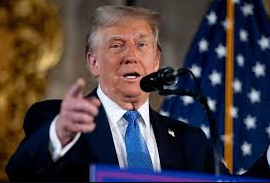
US President Suggests American Control Over Gaza, Ignites International Criticism
In a highly controversial press conference held in the White House’s East Room, President Donald Trump unveiled a proposal that shocked the world. During his meeting with Israeli Prime Minister Benjamin Netanyahu, the US president suggested that the United States could take control of the Gaza Strip, claiming that the region would benefit from American development. His remarks set the stage for what many are calling a dangerously expansionist vision, revealing a more aggressive phase of Trump’s political ambitions.
Trump, who had previously prided himself on an “America First” agenda, shocked the room when he declared, “We will take over Gaza, and we’ll do a job with it, too. We’ll own it.” The statement left many speechless, as the president, notorious for his real estate background, appeared to treat the region as just another property to develop. His comments have been widely condemned as a form of ethnic cleansing, with critics noting that Trump’s proposal comes off as a business venture rather than a humanitarian solution.
The president’s plan for Gaza was detailed in bizarre terms, with him describing the region as “an unlucky place” that had endured a “miserable existence” for too long. He even suggested relocating 1.8 million Palestinians to new territories, funded by wealthy neighbouring nations. His assertion that Gaza could be developed into a “spectacular” international destination stirred further concerns about his intentions, with many fearing that his approach could exacerbate the region’s crisis.
Trump’s remarks have raised alarm globally. He proposed turning Gaza into a “world-class” hub, describing the potential for vast economic development, with jobs and international recognition. But the plan is far from a solution, as it disregards the complex political and humanitarian issues surrounding Gaza. His vision of transforming the area into what he called “the Riviera of the Middle East” underlined his consistent tendency to view political matters through a business lens, reminiscent of his earlier ventures in New York real estate.
Despite his claims of creating jobs and prosperity, many questioned the legitimacy and feasibility of such a proposal. Critics have pointed out that Trump’s history of business failures, legal challenges, and scandals raises doubts about his ability to manage such an ambitious undertaking. The idea of American military involvement in Gaza also sparked fears of further conflict and destabilisation in the region.
Netanyahu, standing by Trump, called the proposal “worth paying attention to,” while heaping praise on the president for his unwavering support of Israel. In contrast, Democratic voices, including Senator Chris Murphy, labelled the idea as reckless, with Murphy stating, “He’s totally lost it.”
As Trump continues to push his vision for Gaza, his rhetoric and policies are rapidly diverging from traditional diplomatic norms. The world now watches as Trump embarks on what many fear could be a dangerous expansionist path that could alter the geopolitical landscape in unprecedented ways. Whether this is a fleeting fantasy or a step towards a new world order remains to be seen, but one thing is clear: Trump’s ambitions are reaching beyond the borders of the US.









